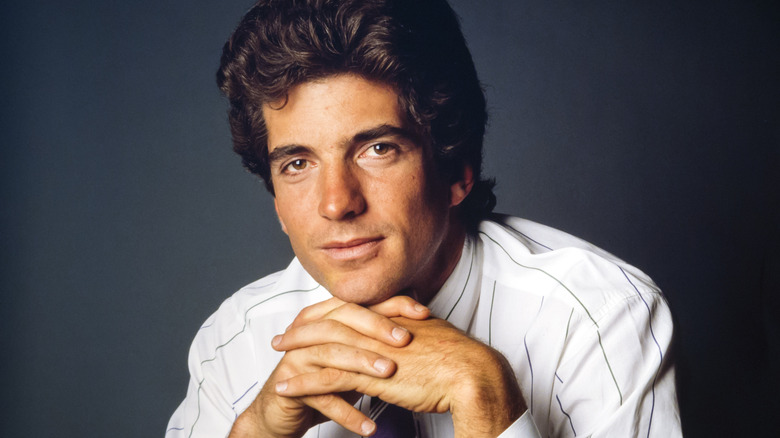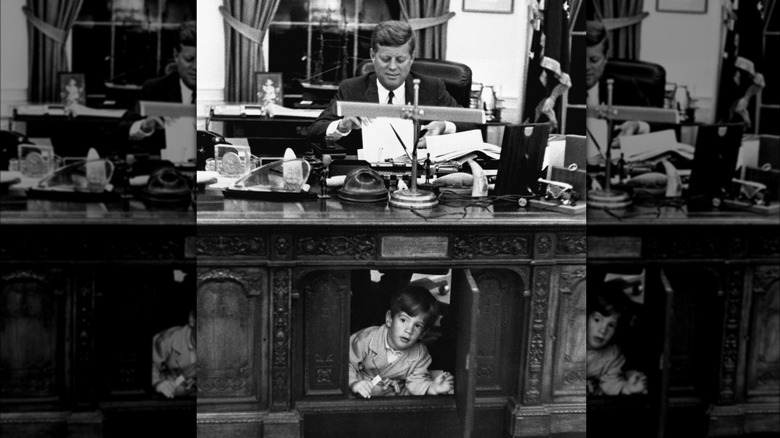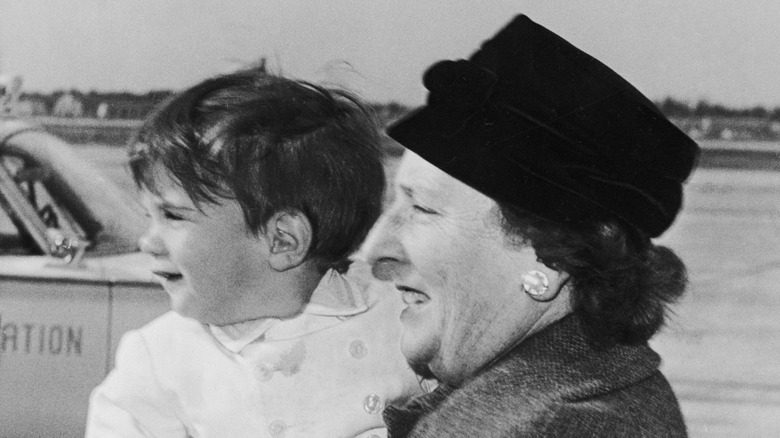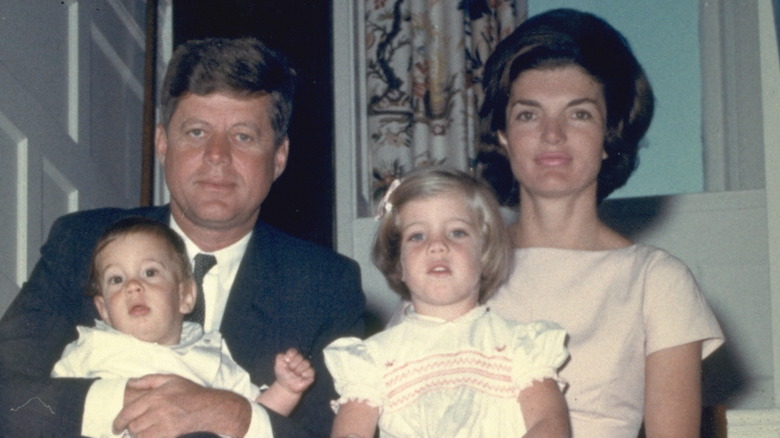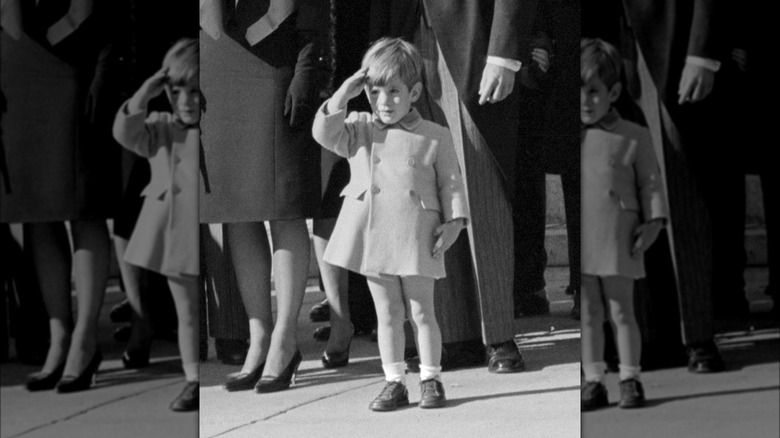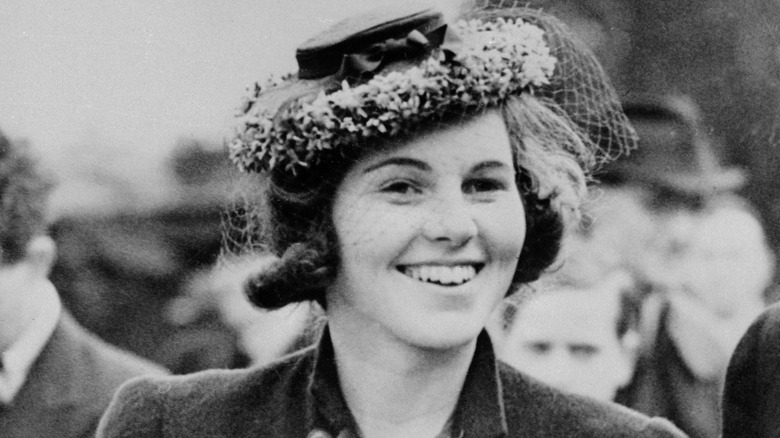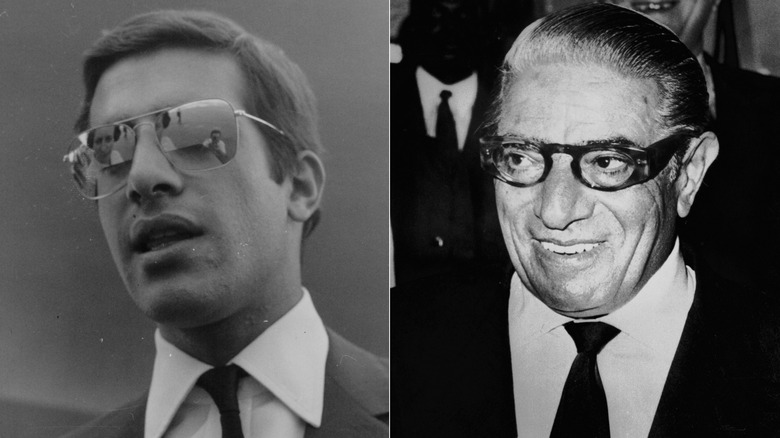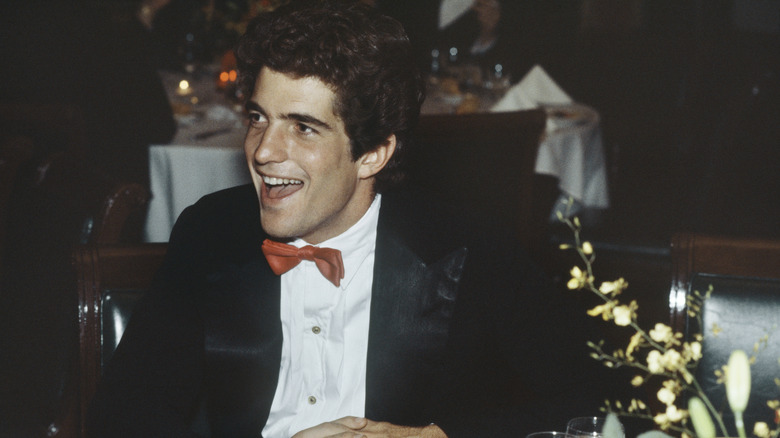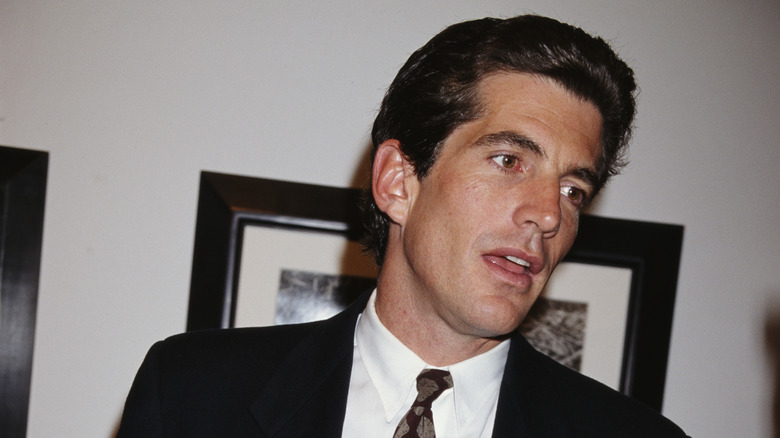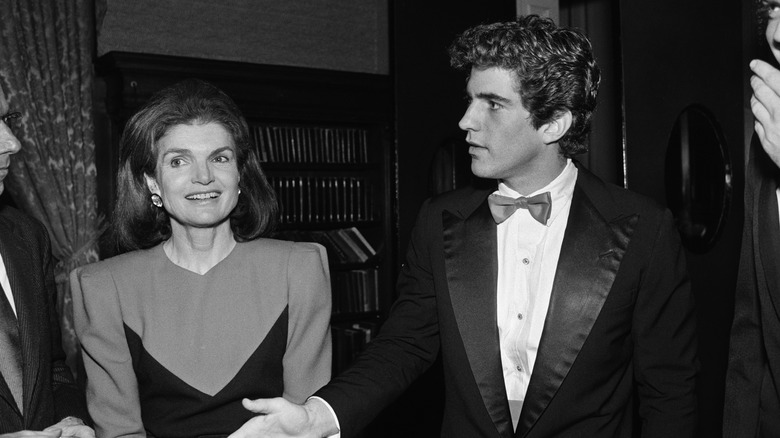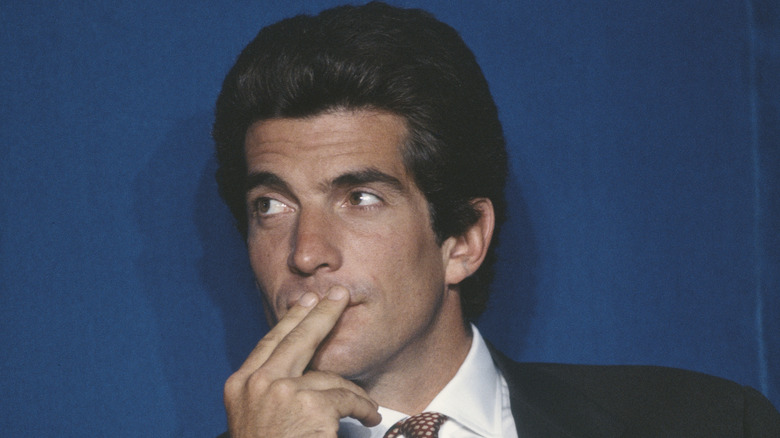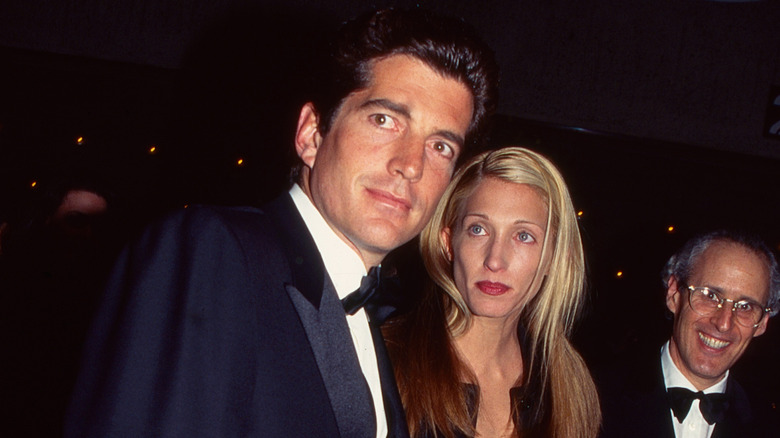Tragic Details About John F. Kennedy Jr.
John F. Kennedy Jr. lived a complicated life. The son of John F. Kennedy and Jackie Kennedy Onassis, John Jr. was part of a dynasty that defined pop culture in the 20th century as much as it impacted political policy. As a child, he was in the media quite often thanks to his father's job and his mother's second high-profile marriage. As an adult, he dated multiple famous women and established a reputation of his own.
But living in the spotlight wasn't easy. He felt the weight of his notable last name and expectations to be as charismatic and accomplished as his father. He left a field he was passionate about to pursue something his mother felt more fitting. John Jr. even went to great lengths to disguise himself just to escape the paparazzi. Anyone who envied the Kennedy heir didn't know just how difficult his life was to navigate.
Let's take a closer look at the tragic details about John F. Kennedy Jr.
John F. Kennedy Jr. never had a normal childhood
John F. Kennedy Jr. is one of the rare people who's been famous since birth. The scion was born just weeks after his father, John F. Kennedy, was elected president of the United States, making one of his very first homes the White House. Simply being a child growing up in the White House put John Jr. in rarified air, let alone being a baby. This led to John Jr. becoming well known as a child for his amusing White House antics, such as playing under the Resolute Desk in the Oval Office while JFK was working.
Things didn't get any simpler for John Jr. after his father's death (more on that later). He grew up without a father, had to get to a know a stepfather, and was the target of multiple kidnapping threats. Despite all this, Jackie Kennedy did her best to give her son a regular upbringing. Former Secret Service agent Clint Hill said to People of John Jr.'s mother: "She gave us implicit instructions that they should be permitted the opportunity to grow up as normal children as humanly possible. And I always kept saying, 'They're the children of a president of the United States, it's never going to be like other children throughout their entire life.' But she really wanted it to be just normal."
John Jr. was only 2 years old when he lost his infant brother
Had Jackie Kennedy's pregnancies all gone as planned, John F. Kennedy Jr. would've had four living siblings. Tragically, only he and one other — Caroline Kennedy — lived past 2 days of age. Jackie's first pregnancy ended in a miscarriage, and her second bore a stillborn. The first lady gave birth to Caroline in November 1957 and John Jr. almost exactly three years later. Then, in August 1963, Jackie delivered Patrick Kennedy, who was born with respiratory distress syndrome.
Per John Hopkins Medicine, the syndrome "is a breathing problem that sometimes affects babies born six weeks or more before their due dates. Their lungs aren't developed enough to make surfactant, a liquid that coats the inside of the lungs and keeps them open so that the baby can breathe in air once he or she is born."
Sadly, Patrick died 39 hours after his birth. His father, John F. Kennedy, was able to meet him, but his siblings were not. While heartbreaking, Patrick's death did push JFK to authorize significant funding for research into respiratory distress syndrome as it had caused the death of thousands of other infants every year prior. Today, this condition is no longer a death sentence.
His father was assassinated just before his third birthday
1963 was quite possibly the most tragic year in family history for the Kennedys, and one of the most harrowing in American history. Just months after John F. Kennedy's son Patrick Kennedy died nearly two days after birth, and just days before his son John F. Kennedy Jr. turned three, the President of the United States was assassinated. JFK was in Dallas, Texas, for a tour of the state, and his wife, Jackie Kennedy, was with him. JFK and Jackie were part of the presidential motorcade driving through Dallas, and after turning off Main Street, the president was shot in the neck and head. He was rushed to the hospital, but nearly a half-hour after being wounded, he was declared dead.
That same day, Lee Harvey Oswald was arrested for assassinating JFK, but that same day he was shot and killed by a man named Jack Ruby. The assassination shocked the country and the world and left an enormous hole in the hearts of the Kennedys. Jackie and her children moved out of the White House, and she spent the following winter in distress. "I consider that my life is over, and I will spend the rest of my life waiting for it really to be over," Jackie said to her friends after JFK's death, as reported by Vanity Fair.
John F. Kennedy Jr. spent his third birthday at his father's funeral
Most children spend their third birthday playing with new toys and enjoying cake and ice cream. John F. Kennedy Jr. spent his third birthday at his father's funeral. Just days before John Jr. turned 3, his father, John F. Kennedy, was assassinated in Dallas, Texas. JFK's body was transferred back to Washington, D.C., and on November 25, 1963, the Kennedys attended the president's funeral and laid him to rest at Arlington National Cemetery.
Although it was his birthday, John Jr. seemed to be focused on honoring his father. The day was partially defined by a photograph captured of the young boy saluting his father's casket among state officials and military personnel. "It was the saddest thing I've ever seen in my whole life," the photographer, Dan Farrell, said of the picture he took, as reported by Town & Country.
As an adult, John Jr. wanted the public to move on from its obsession with JFK's assassination. Historian Steven M. Gillon told People, "John said, 'I don't understand why people are so fascinated with my father's death.' He couldn't understand why people focused so much energy on it. He wanted to remember his father for the life that he lived, and that's how he wanted others to remember him."
His aunt underwent an unsuccessful lobotomy
Plenty of John F. Kennedy Jr.'s personal life was tragic on its own, but his family dealt with tragedy, too, especially the siblings of his father, John F. Kennedy. But perhaps no story from the Kennedy family was as devastating as the tragic story of JFK's sister Rosemary Kennedy, John Jr.'s aunt. When Rose Fitzgerald Kennedy was ready to deliver Rosemary, the doctor was not available, so an attending nurse instructed Rose to close her legs as a way to delay Rosemary's birth. This led to a severe oxygen loss for Rosemary, and in turn, she was developmentally delayed.
Nevertheless, Rosemary was still able to read and write, and she was reportedly a happy child. Still, her parents had her undergo experimental treatments in an effort to assuage her delays. As an adult, Rosemary thrived for a time while living in Europe, but when she returned to the United States at the beginning of World War II, she experienced major setbacks, leading her parents to send her to various institutions across the East Coast. At a loss in November 1941, Rosemary's parents authorized a lobotomy, and the surgery, which is rarely performed today, rendered her unable to walk and speak as she could before. Rosemary lived the rest of her life at an institution in Wisconsin. Her parents didn't visit, but as adults, her siblings did. John Jr. also interacted with his aunt. "He was very natural with her," Elizabeth Koehler-Pentacoff, author of "The Missing Kennedy," told People. He was reportedly "very relaxed with her."
He lost his stepbrother and stepfather within two years' time
Approximately five years after John F. Kennedy died, Jackie Kennedy married Aristotle Onassis, a shipping magnate from Greece. That same year, Robert F. Kennedy, JFK's brother, was assassinated, prompting Jackie to take her children, Caroline Kennedy and John F. Kennedy Jr., with her out of the United States. "If they're killing Kennedys, then my children are targets. I want to get out of this country," Jackie said that year, as reported by The New York Times. This union also brought Caroline and John Jr. a stepbrother, Alexander Onassis.
Not much is known about John Jr.'s relationship with his stepbrother, but given Alexander was quite a bit older than John Jr., it's likely they were not extremely close. No matter the nature of John Jr.'s relationship with his stepbrother, tragedy struck the family again in January of 1973, nearly nine years after JFK's assassination, when Alexander died from a brain hemorrhage following a plane crash. An experienced pilot, Alexander crashed during takeoff while flying a twin-engine plane.
Two years later, in 1975, Aristotle died from pneumonia, making Jackie a widow for a second time and leaving John Jr. without a stepfather.
John F. Kennedy Jr. struggled to pass the Bar exam
John F. Kennedy Jr. had the eyes of the world on him when he began his career. The son of a Harvard graduate, Kennedy attended an Ivy League school too: Brown University. In 1983, he graduated with a degree in American history. A moneyed man with connections, John Jr. tried his hand at acting, but a career in the arts didn't pan out, and his mother wanted him to pursue law. Taking advice from his mother, Kennedy went to law school at New York University.
But all wasn't smooth sailing after graduation. In order to become a practicing attorney in the United States, Kennedy needed to pass the bar exam. Said exam is notoriously difficult, especially in certain states (as of this writing, the overall pass rate in New York is 42%), and it didn't come easy for the political progeny. It ultimately took him three times to pass the bar.
"I'm clearly not a major legal genius," Kennedy said after his second time failing the test, as revealed in the book "American Son: A Portrait of John F. Kennedy, Jr." But John Jr. stuck with it, and after passing the bar on his third attempt, Kennedy got a job as an assistant district attorney in Manhattan.
He owned a failing business
Law was not John F. Kennedy Jr.'s passion. But after watching President Bill Clinton charm America during his 1992 campaign, John Jr. knew just how he wanted to switch gears. The son of one of the most famous presidents in American history came up with the idea for a glossy political magazine.
The industry was booming in the early to mid '90s, and the lawyer was motivated. However, the magazine's proposed topic gave many investors pause, and John Jr. struggled to find funding to get started. Eventually, though, he found a company excited to make his dream into reality, and in 1995, George published its first issue, which featured Cindy Crawford, dressed as George Washington, as the cover model.
The magazine operated with John Jr. as editor-in-chief, and it helped propel politics and pop culture with stars like Charles Barkley, George Clooney, and Charlize Theron posing for the cover. But the magazine wasn't meant to last, and various strains, namely the deteriorating relationship between John Jr. and his co-founder, Michael Berman, as well as John Jr.'s reluctance to cover public scandals within his extended family and President Clinton's affair, proved to be too much for the magazine to handle. "By the end, it seemed to be running out of gas. Advertisers had lost some of the enthusiasm," reporter Keith Kelly told Esquire. John Jr. didn't live to see the magazine fold, which happened just a couple of years after his death.
John F. Kennedy Jr. lost his mother in his early 30s
John F. Kennedy Jr. and Jackie Kennedy had a special relationship. "The single most important thing in John's life was his mother," Peter Duchin, a friend of Jackie's, said of the two, as reported by E! News. John Jr. was said to have been very sensitive to his mother's feelings, and she had great influence on what her son did, what he studied, and who he dated.
Sadly, tragedy struck John Jr. again in 1994. After losing his infant brother, father, stepbrother, stepfather, and others in the Kennedy family, John Jr., who was 33 years old at the time, lost his mother. "Last night, at around 10:15, my mother passed on. She was surrounded by her friends and family and her books, and the people and things that she loved. She did it in her own way and on her own terms, and we all feel lucky for that, and now she's in God's hands," John Jr. shared with the press upon his mother's death.
Jackie was 64 years old when she died of non-Hodgkin's lymphoma. The former first lady had been undergoing treatment, but it proved fatal. "You are not a true adult until both of your parents have passed on, you are then an orphan," John Jr. is quoted as saying after his mother died (via HuffPost).
He lived in the shadow of his father's complicated legacy
John F. Kennedy's reputation has always preceded him, even after his death. When hearing his name, a variety of sordid appellations come to mind, including womanizer. Between JFK's list of alleged mistresses and his tragic death, he's remained a complex figure in American history.
That complicated legacy cast a shadow on his son, John F. Kennedy Jr. "It seems like it would be a cakewalk for me because everyone expects me to [be] a great man. But it does seem to me, as I read these biographies of great men through history, they were not particularly great at home. Even my father was no model," John Jr. told his friend John Perry Barlow, as reported by People.
As noted, JFK's death also affected John Jr. — but not because he was haunted by it. The public wanted to engage with John Jr. about his father's death, but he wanted to focus on what JFK did while he was living. "That act, that day does not have much to do with my life. My father's life has to do with my life," John Jr. said on ABC's "Prime Time Live" (via Tampa Bay Times).
John F. Kennedy Jr. died in a horrific plane crash
John F. Kennedy Jr.'s life ended in a most tragic way. He along with his wife Carolyn Bessette Kennedy and his sister-in-law Lauren Bessette were on their way to John Jr.'s cousin Rory Kennedy's wedding in Cape Cod, Massachusetts. John Jr. was piloting the plane, and the trio were presumed missing after their plane didn't land at Martha's Vineyard as scheduled. Investigators confirmed soon after that the plane had crashed into the Atlantic, and John Jr., Carolyn, and Lauren's bodies were found in the ocean along with pieces of the plane.
"We are filled with unspeakable grief and sadness by the loss of John and Carolyn and Lauren Bessette. John was a shining light in all our lives and in the lives of the nation and the world that first came to know him as little boy," Senator Ted Kennedy said after the accident (via The Washington Post).
Shocked by the news, the public, as well as those close to John Jr., had many questions about the cause of the accident. Upon further investigation, it was determined that the plane crash was due to pilot error. "He should not have gone up that night. At the first sign of danger, he should have done what a lot of pilots did that night and flew inland, away from the ocean, spend the night somewhere and then pick up the next morning," John Jr.'s friend, historian Steve M. Gillon, told People.
